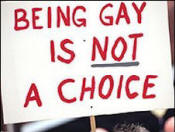Therapists offer gay 'treatment'

The Health Protection Agency estimates revealed nearly four in 10 of the 7,370 cases last year were in gay men - twice the number of a decade ago.
Recent studies have suggested high numbers of gay men are engaging in unsafe sex.
However, the number of new diagnoses overall and within the gay community has fallen slightly year-on-year.
Dr Barry Evans, an HIV expert at the HPA, said: "Gay men continue to be the group in the UK most at risk of acquiring HIV. "Safe sex is the best way to protect against HIV infection." The figures, which are estimated because the agency has not got all the data from clinics, showed overall new diagnoses had fallen from 7,660 in 2007.
Among gay men there was a slightly larger fall proportionally from 3,050 to 2,830, but it was still the second largest number since recording began in the 1990s.
The HPA also expressed concern about the high number of late diagnoses.
A fifth of cases among gay men were beyond the point at which treatment should have begun, raising the risk of death within the first year.
Proportion
Deborah Jack, chief executive of the National Aids Trust said: 'We welcome the fall in the number of new diagnoses of HIV - but we need to wait to see whether the trend is really downwards or still plateauing. "But most importantly, we must remember that gay and bisexual men are still the people most affected by HIV here in the UK - with one 1 in 20 gay and bisexual men infected with HIV.
"If that proportion of the general UK population had HIV it would be headline news."
She also said it was worrying that the number of heterosexual cases from sex in the UK - most of the heterosexual diagnoses are from sex abroad, mostly within African communities - showed signs of rising.
In 2008 there were just over 1,000 new cases - up by 110 from 2007.
However, the charity said it was still a tiny proportion of the people engaging in heterosexual sex.
Lisa Power, of the HIV charity Terrence Higgins Trust, said: "Numbers of people diagnosed with HIV are rising for many reasons.
"More people are getting tested, which is good. But some people don't realise they could be at risk, and others take risks despite knowing them. HIV is not a risk worth taking."
Source BBC Website - http://news.bbc.co.uk/1/hi/health/7967881.stm

Therapists are still offering treatments for homosexuality despite there being no evidence that such methods work, research suggests.
A significant minority of mental health professionals had agreed to help at least one patient "reduce" their gay or lesbian feelings when asked to do so.
The survey, published in the journal BMC Psychiatry and conducted by London researchers, involved 1,400 therapists.
Many were acting with the "best of intentions", said the lead author.
Only 4% said they would attempt to change a client's sexual orientation, but when asked if they would help curb homosexual feelings some 17% - or one in six - said they had done so.
The incidence appeared to be as prevalent in recent years as decades earlier.
"Of course it's incumbent on a professional to assist a client who wants help, but this should be done using evidence-based therapies - exploring their distress and helping them to adjust to their situation," said Professor Michael King of University College London.
"We know now that efforts to change people's sexual orientation result in very little change and can cause immense harm.
"We found it very worrying that there was a significant minority who appeared to ignore this - even if they had all the right intentions."
'Right to treatment'
The Royal College of Psychiatrists says all homosexuals have "a right to protection from therapies that are potentially damaging, particularly those that purport to change sexual orientation".
In the US, where there has been heated debate on the issue of "curing" homosexuality, The American Psychiatric Association (APA) has urged all "ethical practitioners to refrain from attempts to change individuals' sexual orientation".
However there are organisations which campaign both for an individual's right to seek treatment and a professional's right to offer it.
They point to work by Robert Spitzer, a psychiatrist who lobbied for the removal of homosexuality from APA's list of mental illnesses but went on to suggest in a controversial 2001 study that therapy could bring about change in sexual orientation.
Researchers in the UK are launching a website to collect stories from around the world about such therapies.
They hope in this way to uncover stories from India, South America and China where little is known about the prevalence of such practices.
Derek Munn, of the gay rights campaign group Stonewall, said: "The conclusions of this research are a welcome reminder that what lesbian and gay people need is equal treatment by society, not misguided treatment by a minority of health professionals."